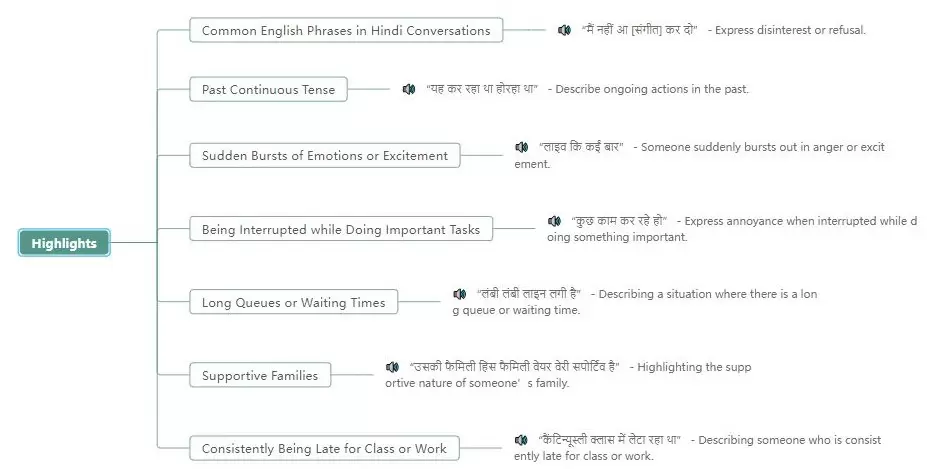Daily Use English phrases will help you speak english at home with your kids.
Key ponits for daily use english phrases (in past continuous):
- Describing Ongoing Actions: Past continuous tense is used to describe actions that were in progress at a specific point in the past, providing a sense of continuity.
- Setting the Scene: It helps set the scene by providing context and background information.
- Adding Depth to Narratives: By portraying actions as ongoing, past continuous tense adds depth and detail to narratives, allowing listeners to visualize events more clearly.
- Expressing Simultaneous Actions: It allows us to express multiple actions happening simultaneously in the past, highlighting the dynamic nature of the situation.
- Conveying Atmosphere and Emotion: Past continuous tense can convey the atmosphere and emotional state surrounding past events, enhancing the overall tone of the narrative.
- Providing Clarity: It helps clarify the sequence of events in a story, making it easier for listeners to follow along and understand what happened when.
Mind map:

Examples for Daily Use English Phrases:
- The birds were chirping loudly as the sun was setting.
- Suraj dhalne ke samay parinde zor se chir rahe the.
- सूरज अस्त होने के समय पक्षी जोर से चिल्ला रहे थे।
- I was watching TV when the power went out.
- Main TV dekh raha tha jab bijli chali gayi.
- मैं टीवी देख रहा था जब बिजली चली गई।
- She was cooking dinner when I arrived home.
- Usne ghar par aate hi khana bana rahi thi.
- जब मैं घर पहुंचा, तब वह खाना बना रही थी।
- They were playing football in the park yesterday.
- Woh kal park mein football khel rahe the.
- वे कल पार्क में फुटबॉल खेल रहे थे।
- He was studying for his exam while listening to music.
- Usne exam ke liye padh rahe the jabki music sun rahe the.
- उसने परीक्षा के लिए पढ़ रहे थे जबकि संगीत सुन रहे थे।
- We were driving to the beach when it started raining.
- Hum beach ki taraf car chala rahe the jab barish shuru ho gayi.
- हम बीच की ओर जा रहे थे जब बारिश शुरू हो गई।
- They were laughing uncontrollably at the comedy show.
- Woh comedy show mein besudh has rahe the.
- वे हंसते हुए कॉमेडी शो देख रहे थे।
- She was dancing gracefully at the party last night.
- Usne kal raat ko party mein grace se naach rahe the.
- उसने कल रात पार्टी में ग्रेस से नाचा।
- He was talking on the phone while cooking dinner.
- Woh khana banate samay phone par baat kar rahe the.
- वह खाना पकाते समय फोन पर बात कर रहे थे।
- The children were playing with their toys in the living room.
- Bacche living room mein apne khilo.
- बच्चे लिविंग रूम में अपने खिलौनों के साथ खेल रहे थे।
- She was reading a book when the phone rang.
- Usne kitab padh rahi thi jab phone baja.
- उसने किताब पढ़ रही थी जब फोन बजा।
- They were walking in the park while chatting happily.
- Ve park mein ghoom rahe the jabki khushiyon se baatein kar rahe the.
- वे पार्क में घूम रहे थे जबकि खुशियों से बातें कर रहे थे।
- He was painting a picture while listening to his favorite music.
- Usne apne pasandida gaane sunte hue ek tasveer banai.
- उसने अपने पसंदीदा गाने सुनते हुए एक तस्वीर बनाई।
- The teacher was explaining the lesson when the students started asking questions.
- Shikshak parhane waqt the jab vidyarthi sawalon ka jawab dhundne lage.
- शिक्षक पढ़ाने के वक्त थे जब विद्यार्थी सवालों का जवाब ढूंढने लगे।
- We were having dinner when the unexpected guests arrived.
- Hum raat ka khana kha rahe the jab anjaane mehman aaye.
- हम रात का खाना खा रहे थे जब अनजाने मेहमान आए।
Recent Comments